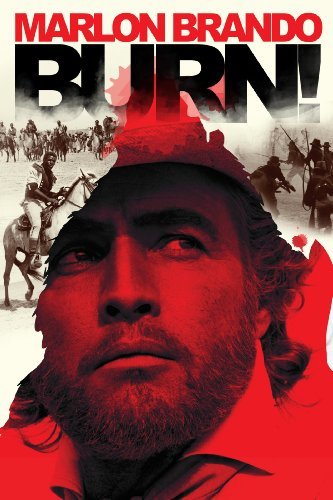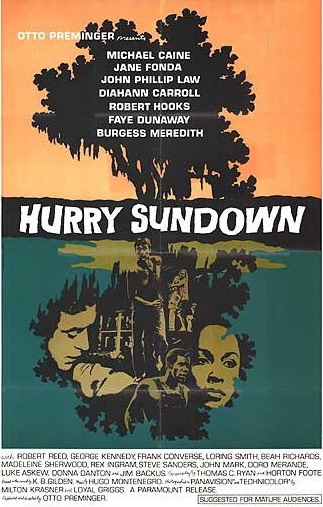 Earlier, I criticized Otto Preminger’s Hurry Sundown for taking a rather timid approach to the politics of race and class. To see just how politically safe Hurry Sundown was, one need only compare it to 1969’s Burn, an Italian film that is perhaps one of the most politically radical films ever made.
Earlier, I criticized Otto Preminger’s Hurry Sundown for taking a rather timid approach to the politics of race and class. To see just how politically safe Hurry Sundown was, one need only compare it to 1969’s Burn, an Italian film that is perhaps one of the most politically radical films ever made.
Though the story told in Burn is a fictional one, it will still be familiar to anyone who has studied the history of South America. Set in the 19th century, Burn takes place on the island of Quiemada, a colony of Portugal that is largely populated with black slaves who are forced to work on sugar plantations. As the film makes clear, sugar was as economically valuable in the 19th century as oil is today. So, it really shouldn’t be surprising that, as the film opens, Sir William Walker (Marlon Brando) has been sent to the island on a mission to overthrow the colonial government and replace it with one that will be friendly to British sugar companies.
Walker does this by inspiring the slaves to revolt. To serve as a figurehead leader for the revolution, he selects a porter named Jose Delores (played by Evaristo Marquez, a nonactor who was both illiterate and working as a herder when he was selected for the role and who made up for his lack of experience and training by bringing a raw authenticity to the role). Under Walker’s direction, Jose quickly becomes known as a fearsome and great leader. Along the way, the two of them develop a paternalistic relationship with Jose looking up to Walker and Walker openly taking pride in Jose’s transformation from slave to general.
When the Portuguese eventually leave the island, the British set up a corrupt puppet government. When Jose argues for more of a role in the new government, Walker explains that none of the former slaves have the education necessary to lead a country. As Jose quickly realizes, the entire revolution was actually fought to benefit the British. Walker leaves the island and Jose and the former slaves return to working on the sugar plantations. They may no longer be slaves but they’re definitely not free. (Or, as Jose puts it towards the end of the film, one cannot be given freedom. Instead, freedom has to be grabbed.)
10 years later, Jose is leading another revolution, this time against the British-backed government. Walker is sent back to the island with a new mission, to track down and defeat Jose. When Walker first arrives back at the island, he assumes that, despite his earlier betrayal, he and Jose are still friends. As quickly becomes obvious, Jose doesn’t feel the same way…
Now, I have to admit that I didn’t see Burn under the best of circumstances. Not only did I see it on TV with regular commercial interruptions for that Risperdal lawsuit but, upon doing some online research, it also became obvious that I had watched a version of the film that was heavily edited prior to its American release. 20 minutes of footage was crudely taken out of Burn before it played in American theaters. As a result, the version of Burn that I saw had a jagged and rather crude feel to it. It was obvious that important scenes had been dropped and the end result felt disjointed.
And yet, despite all of this, Burn was still a powerful and memorable film. I say this despite the fact that rigidly political films (which this one definitely is) usually tend to bore me to tears. Even in its crudely edited form, Burn was full of powerful scenes that both made a political point and also displayed enough humanity to transcend the limits of ideology. Consider the scene where, after having just learned that his revolution has accomplished nothing, Jose is hailed as a hero by his fellow revolutionaries. In a matter of minutes, Jose goes from feeling like a failure to feeling triumphant to again feeling like a failure as he realizes that their freedom is going to be short-lived. Or how about the scene where William Wallace crudely but effectively explains how the economy works by comparing a housewife to a prostitute? And finally, there’s the film’s final scene, which is one of the most powerful that I’ve ever seen.
And then there’s Brando.
As played by Marlon Brando, William Walker comes to epitomize both cynicism and self-loathing. Reportedly, director Gillo Pontecorvo wanted to portray Walker as being a much more obvious villain and Brando fought for a more ambiguous approach to the character. What’s interesting is that, by hinting that Walker does what he does despite his guilty conscience, Brando makes the character into a much more loathsome monster than he would have been if he had been played as an unrepentant villain. Brando’s best moments come towards the end of the film, when Walker struggles to understand how Jose could be willing to sacrifice himself for a greater cause.
Whenever we discuss Brando nowadays, its to talk about his eccentricities and his weight. We talk about the fact that he was known for being difficult and that he eventually reached the point where he openly boasted about no longer caring. What should be discussed is that, regardless of what he became later in his life, Marlon Brando was a great actor. A film like Burn reminds us of that fact.




